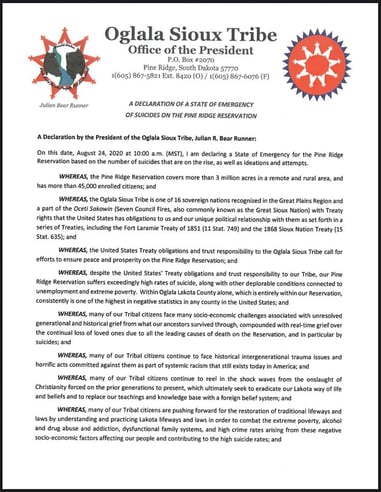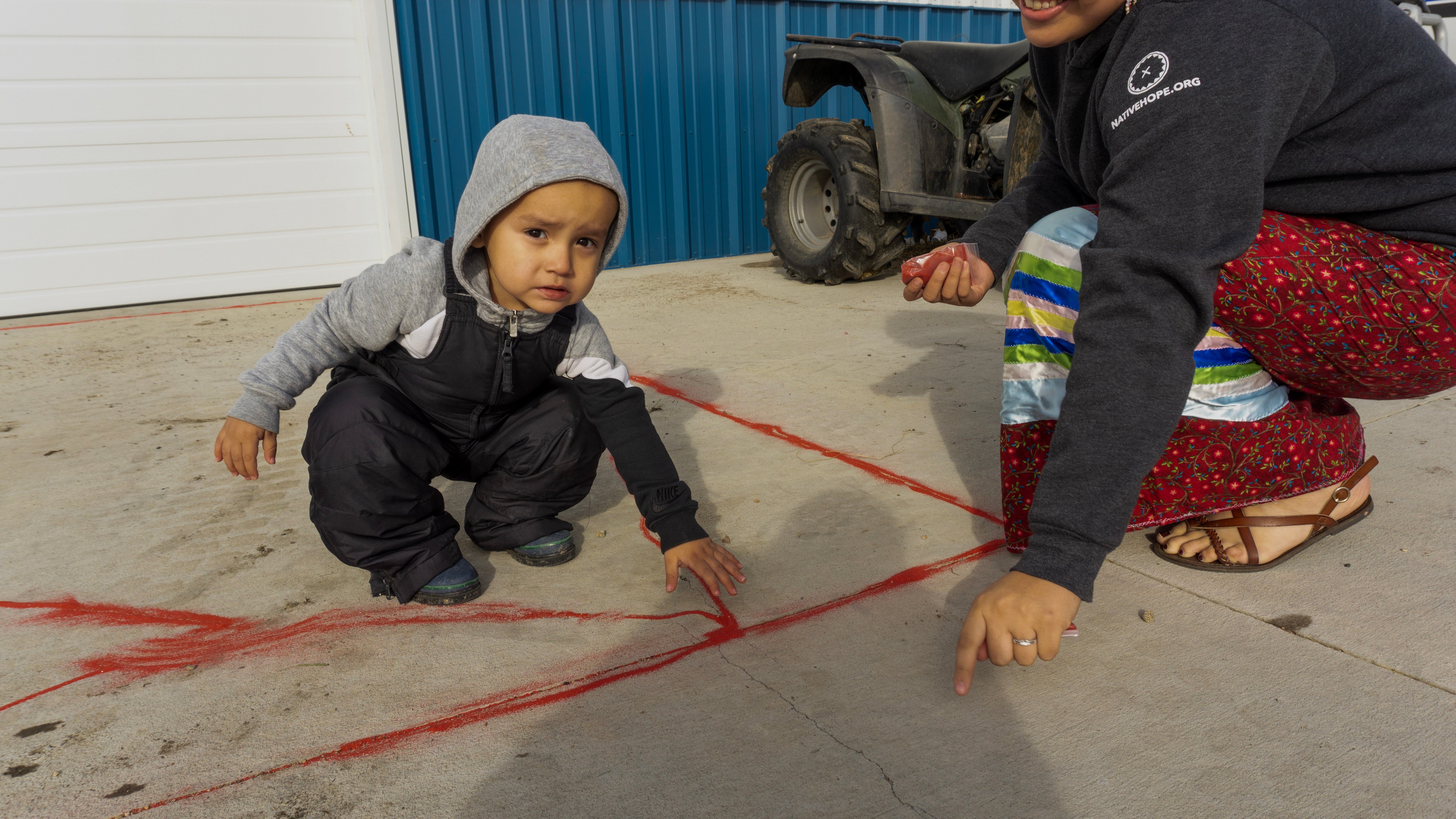Sep 1, 2023 | Native Hope
During the pandemic, people across all nations, Native and non-Native, dealt with escalating rates of suicidal ideation and completion. Suicidal thoughts stem from several sources. Depression is a significant source, but substance abuse, physical abuse, divorce, and high amounts of stress can contribute to thoughts of self-harm. When a person is in pain, fixating on suicide feels like the best solution—but that’s not true. Suicide is not the answer.
For the month of September, National Suicide Prevention Month, we will focus on providing information and resources for those struggling in the shadow of this growing health crisis.
Native American suicide rates
Save.org lists some facts about suicide that show it is indeed a real problem. It’s the 12th leading cause of death, and approximately one person dies from suicide every 11.5 minutes. In 2020, 45,979 people died by suicide. According to innerbody.com, "Since 1999, rates of suicide have increased by 71% and 139% for Indigenous men and women, respectively."
If you are having suicidal thoughts, it’s not just a phase or something to “get past.” It’s a serious problem, and that’s why you need someone to help you.
Even if you’re not having these thoughts, you may be suffering from chronic depression. It may not come as a surprise, but such depression can lead to thoughts of suicide. According to Psychiatry Advisor, “the onset of depression is the leading cause of morbidity in adolescents.”
Those working on Native American suicide prevention
 The Pine Ridge Sioux Tribe [Oglala Sioux Tribe] in South Dakota declared a state of emergency due to the increase in suicide on their reservation. During the month of August 2020, the tribe lost four members to suicide. The pandemic presented the Tribe with an increased sense of isolation which many feel was a contributing factor of the spike.
The Pine Ridge Sioux Tribe [Oglala Sioux Tribe] in South Dakota declared a state of emergency due to the increase in suicide on their reservation. During the month of August 2020, the tribe lost four members to suicide. The pandemic presented the Tribe with an increased sense of isolation which many feel was a contributing factor of the spike.
In March 2020, the Pine Ridge Reservation went on lockdown as a protective measure. Travel to and from the reservation was nearly non-existent. The goal was to protect this small population of 19,000 from a devastating community spread. Lockdown was successful in controlling the amount of positive cases of COVID-19; however, it increased the sense of loneliness and despair.
Former President of the Oglala Sioux Tribe Julian Bear Runner knows first-hand about these feelings as he self-quarantined for two weeks and endured a month-long suspension.
“During that time, it was mentally challenging, and I experienced something I hadn’t experienced in a long time,” said Former President Bear Runner. “It was very trying, and it was very hard mentally to separate yourself from society and from your family and to seclude yourself.”
Former President Bear Runner along with Tiny DeCory, Native Hope Fellow, and Eileen Janis from the BEAR program, a suicide prevention program, drafted the declaration to call for a state of emergency.
"In the declaration, Bear Runner called on the federal government to provide ‘sustainable, consistent, and perpetual funding’ to assist in suicide prevention efforts. He also 'demands that the previously established Tribal-Suicide Task Force be re-enacted immediately to develop and implement strategies for combating the high rates of suicide' and 'provide a report within 30 days' to present to the United States Congress for action" (NewsCenter1).
This action is invaluable to the Oglala's fight against suicide and its effects on the tribe.
In addition to tribes working to assist suicide prevention efforts, a new bipartisan legislation aims to provide theMental Health Services Native American veterans receive. This was prompted by high suicide rates among Native American and Alaskan Native veterans.
“Throughout our history, I am proud that Native Americans have consistently enlisted in the United States military at a higher rate than any other racial or ethnic group. Like all veterans, Native Americans who have served in uniform deserve the best care and service the VA can provide. Therefore, it is critically important that VA medical personnel are equipped to recognize, understand and address their unique needs,” Cole said in a statement. U.S. Rep. Tom Cole (R-OK), is member of the Chickasaw Nation of Oklahoma.
Moreover, Native American veterans often do not have access to mental healthcare that respect cultural needs. “We must do more to help our most vulnerable populations by providing them the necessary support before their mental health reaches a crisis point,” Rep. Xochitl Torres Small (D-N.M.) said.
Looking at long-term suicide prevention
Unfortunately, depression and suicide are not uncommon in the United States. If you or someone you know are having suicidal thoughts, the Center for Disease Control [CDC] has plenty of good information about suicide, but they also offer the following suggestions to help people avoid suicidal thoughts:
- Make sure you have strong relationships with family and friends. Talk to the people in your life, and make sure they understand what you’re going through. Then, spend time with them to strengthen the relationships.
- Know where to get help. Bookmark this page, and if needed, add the National Suicide Prevention Lifeline to your phone. You can also get the address of your local emergency room.
- Get professional help. Talking to people you trust is important, but doctors and therapists are specifically trained to help you handle suicidal thoughts.
- Treatment navigators are ready to guide you. Take the first step.
What to do right now
If you or someone you love is suffering from suicidal thoughts, the key, right now, is to talk to someone.
Call the National Suicide Prevention Lifeline at 1-800-273-8255. You’ll be connected to a trained person who can help you understand what’s going on in your head. The call is free and confidential, and you can call at any time of day or night. Someone is always there for you if you need immediate help—call the hotline above. Maybe making a phone call and speaking to someone is too embarrassing or hard. That’s why the American Foundation for Suicide Prevention has other options available to you.
- If you prefer texting, you can send TALK to 741741. You’ll be connected with a crisis counselor, and like the lifeline, it’s free and available at all hours of the day or night.
- You can also chat online with a counselor at the Crisis Chat Service.
- If you are a veteran, you can send a text to 838255 or contact Vets4Warriors at 855-838-8255.
You can also call or visit your local emergency room. While the ER is set up to deal with physical emergencies like broken arms, a heart attack, or difficulty breathing, suicidal thoughts are considered a serious condition. ER staff can help talk you through your suicidal thoughts with the help of an on-call social worker, who can then assist you with getting more long-term help.
Storytelling Heals
There are times when it feels like suicide is the only answer, but that’s untrue. You can be in a very bad place, but in the end, you deserve to live and see how much better life can get.
If you are having suicidal thoughts, it’s imperative that you call or text one of the resources listed above. Then, you can focus on long-term care to make sure you can find a way to enjoy life and live it to the fullest. Life can be difficult, but it can also get better.
You are not alone. Share your story, talk to someone, remember storytelling heals.
If you or someone you know is struggling with suicidal thoughts, please call the Suicide Prevention Lifeline at:
1-800-273-TALK.
We invite you to join us in The Circle of Hope, a community of people passionate about bringing hope to Native American youth.





COMMENTS